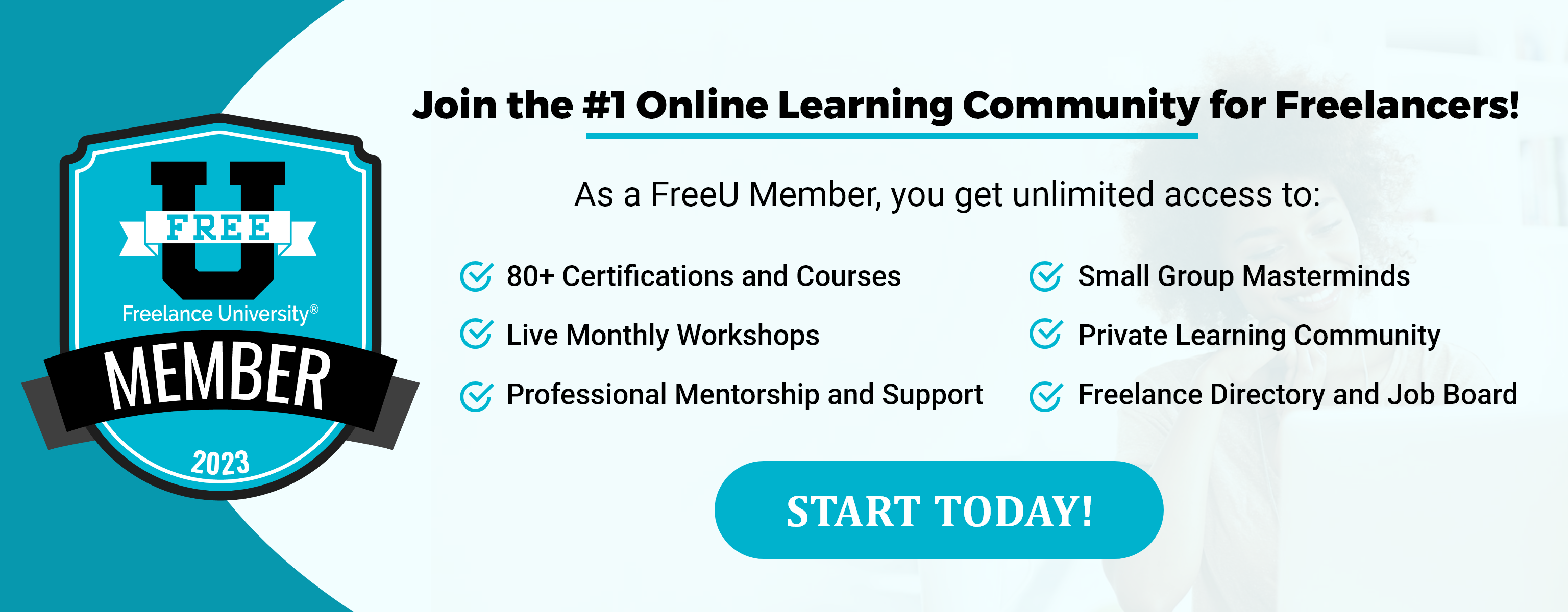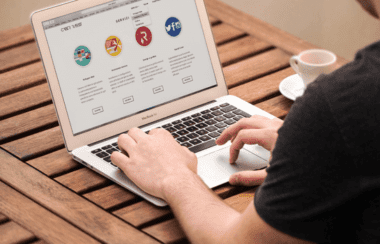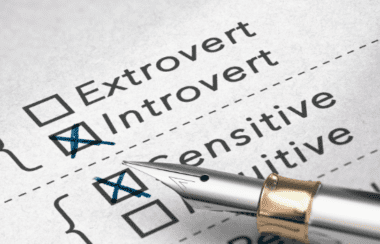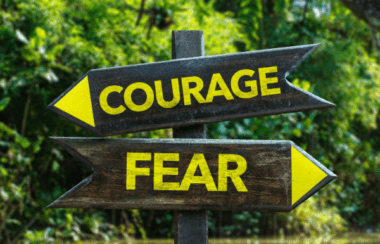An Introvert’s Guide to Networking like a Rock Star
By Jena Kroeker

How do you feel about networking? Many of us find it challenging, no matter what type of personality we have. We may feel shy, fearful, or just plain bored with it.
If that’s the case, you may be wondering why this blog post is titled “An Introvert’s Guide to Networking.” Well, first of all, because the author (yours truly) is an introvert. And secondly, because the strategies that help introverts network successfully can help all of us build authentic connections.
As Freelance University co-founder Craig Cannings says in his skill workshop “Become a Networking Rock Star,” you don’t have to be suave. You just need to be yourself and build relationships – something both introverts and extroverts can do!
Now, before we get started, it’s important to understand the difference between introversion, extroversion, and shyness.
Both Introverts and Extroverts Can Be Shy
I first found out I was an introvert when I took the Myers-Briggs Type Indicator (MBTI) personality inventory. As a child, I was often called shy because I kept to myself and didn’t talk much in groups. I preferred staying home on the weekend and reading books rather than socializing. In fact, one of my favorite internet memes says, “I like to party and by party I mean read books.”
But an acquaintance once observed me interacting at a social event and remarked, “Jena isn’t shy; she’s just quiet.”
And that description is perfect. It’s also the title of the best book I’ve ever read about introverts – Quiet by Susan Cain. In her popular Ted Talks video, “The Power of Introverts,” Cain explains how introversion is different from shyness:
“Shyness is about fear of social judgement. Introversion is more about how do you respond to stimulation, including social stimulation. So extroverts really crave large amounts of stimulation, whereas introverts feel at their most alive and their most switched-on and their most capable when they’re in quieter, more low-key environments.”
Both introverts and extroverts can feel shy about networking. We can all be fearful of attending an event. But there are ways we can leverage our strengths and deal with any anxiety or discomfort.
Here are ten strategies you can use as a guide to networking like a rock star:
Before the Event
1. Determine how you feel about networking.
When you know a large networking event is coming up, or even a smaller social event, how do you feel? Anxious? Excited? Or does the word “UGH” pretty much sum it up?
Although I sometimes feel intimidated by groups of people, my primary thought about events is “UGH.” I have a perfectly good Emily Bronte novel waiting for me at home, and I’m longing for some quiet time. I also dislike the idea of schmoozing or tooting my own horn. And networking events can lead to comparison, where I might feel like I’m not as cool or knowledgeable as I thought.
In an article titled “4 things every introvert should do before a networking event” Ryan Paugh suggests redefining what networking looks like to you. He says,
“Introverts, who tend to deflect attention away from themselves, are more empathetic and focused on the needs of others. I believe this should be the primary purpose of networking. This ‘habitual generosity’ is a key trait of what my partner, Scott Gerber, and I, call a ‘superconnector.’ They are people more focused on true, long-term relationship building than on superficial, transactional connections. In fact, I’d argue that both introverts and extroverts should stop using the term ‘networking,’ and start using the term ‘relationship building.’ For introverts specifically, this term leans toward your strengths.”
2. Set goals for the event.
If you’ve observed extroverts at an event, you may see them mingling with people throughout the room. “Working a room” is a daunting phrase that makes me feel tired just thinking about it.
If you’re an introvert, consider how you develop relationships in your personal life and relate it to your business life. Do you tend to build deeper relationships with a smaller group of people? Do you thrive on having one longer conversation rather than ten shorter ones?
As you prepare to network, ask yourself these questions:
• How many new connections would I like to make?
• How many people can I talk to at an event without wearing myself out?
• Do I know who will be there so I can look for certain people?
In our Freelance University workshop, Craig Cannings says, “It’s 10 times more valuable to develop connections with 3 quality people at an event than 30 ‘contacts’ whose names you won’t remember!”
3. Research the event.
For me, there’s nothing worse than having no idea what I’m walking into. Knowing things like location, dress code, size and setup of the room can make a huge difference in how I feel about attending an event. Often it’s as simple as figuring out which way I’ll turn after I walk in the door.
Larger conferences or events often have a dedicated website where you research the venue and event schedule. If you’re feeling anxious about an event, the following types of information can help:
• Duration of the event
• Event agenda
• Dress code
• Number of people attending
• Info about the hosts and attendees
• Any volunteer positions available
• Recommended parking
You may not be able to find out all this information, but anything you can discover will help. If you live in the same city as the venue, try doing a survey of the area. Visit the location and (if possible) walk into the room so you can plan how you’ll move around. Any little bit helps. Even knowing what type of food will be served can help you look forward to the event!
4. Get enough rest.
One of the things that makes me hesitant to network is knowing how tired I’ll be the next day. As an introvert, I derive my energy from solitude, and interacting with people drains me. I might start out fairly energetic, but by the end of the event, I can barely put a sentence together.
Jessica Stillman shares some great advice from Women 2.0 founder, Andrea Barrica, in an article titled “5 Kick-Butt Introvert Networking Tips You’ve Never Heard Before.” Barrica says, “If I know that I’m going to be at a networking-heavy event in the evening, I fuel my batteries by sleeping in and keeping the beginning of my day very light.”
If you’re an introvert, consider blocking off some alone time so you can charge your batteries, and avoid having a busy day with lots of interaction. Be sure to take some time off the next day too.
5. Prepare and practice an elevator speech.
One of the strengths introverts have is our way of thinking carefully before we speak. Although we may feel tongue tied when we’re put on the spot, our words are often valuable and meaningful when we do say them.
Whether or not conversation comes easily to you, it’s always a good idea to prepare a 20- or 30-second elevator speech for your business. As you do, think about the skills and value you add to the freelance or virtual assistant industry. Use this preparation as a way of building your confidence.
Allow your elevator speech to share who you are and how you help and benefit others. You can either memorize your speech or prepare point form notes. Sometimes memorizing point form notes can help you speak more naturally in the moment. Chances are, someone will ask you what you do, and having a good answer prepared can take a load off your mind.
At the Networking Event
6. Arrive early or on time.
Now the big day is here! The last thing you want to do is arrive late. If possible, arrange your day so you can get ready for the event at a leisurely pace and arrive either early or on time.
Arriving early gives you the advantage of some quiet time beforehand. You don’t have to enter the venue right away, but you can park your car in a prime location that lets you leave promptly after the event. If you’re arriving by transit, you can go for a stroll in a nearby park or sit in a cafe and collect your thoughts.
Since large groups of people can create an overstimulating environment for introverts, try to make your arrival as calm and stress-free as possible.
7. Be comfortable in your own skin.
No matter what your personality is, remember you are enough! Introverts and extroverts are equally valuable and equally capable of making good connections. And we are all unique. Not everyone fits into the exact mold of an introvert or extrovert.
Jon Levy stresses the importance of being yourself in his article “8 Networking Tips For Introverts From A Superconnector.”
He says,
“Beating yourself up for not having a loud, extroverted personality will only hold you back. Although it is important to learn from extroverts, expecting yourself to behave like one is futile.
“If you feel more comfortable in small groups, there is absolutely nothing wrong with that. The key is to understand your advantages. For example, as an introvert you may be able to create more long-lasting, intimate relationships. You can focus on the ones that really matter.”
Think back to your elevator speech and what you have to offer. Smile, be friendly, listen to others, and share your authentic self.
8. Set your own pace.
Did you sleep in the day of the event? Did you keep your schedule quiet? Maybe you even had a nap before the event… and then 20 minutes after it starts, you can feel your energy waning.
For introverts especially, it’s important to take breaks. Head over to the food table and grab something to eat or drink. Leave the room to check your phone or step outside for a breath of fresh air. A few minutes without talking can give you the stamina to continue.
Also, be sure to remember the goals you set. Don’t feel you need to compete with others who are moving quickly around the room. If you’ve already spoken to a few people, don’t pressure yourself. Be open to new connections, but feel free to reconnect and deepen existing connections.
And if you haven’t reached your goal, don’t sweat it. Quality is more important than quantity.
9. Don’t take things personally.
I could write a book on awkward networking experiences. In addition to being quiet, I look younger than my age. “But how can that be bad?” you might ask.
Well, I’ve often introduced myself to someone, feeling good about my many years of freelancing experience, only to be asked, “Are you a student?” And sometimes people meant high school student.
Other times, the room was noisy, and my voice was soft. Before I was married, my name was “Jena Petrescue.” In a noisy environment, people often heard it as “Jennifer Rescue.” And now that I’m married, people often read my name tag and pronounce my last name Kroeker as “Croaker.” I then have to explain that the “oe” is actually pronounced “ay” as in “Krayker.” Not confusing at all!
You may also speak with people whose eyes are darting around, telling you they’re looking for other people to connect with. All these types of awkward conversations come with the territory. You might feel hurt or embarrassed at times, but speak kindly to yourself, don’t take it personally, and carry on.
10. Celebrate your successes and plan for next time.
First of all, did you show up? If your answer is yes, that’s worth celebrating! Whether you networked with one person or twenty, simply showing up is half the battle.
Once you’ve had a chance to rest and recharge your batteries, spend some time reviewing your networking experience and ask yourself these questions:
• Do you feel like you were adequately prepared for the event?
• If not, what could you do differently next time?
• Did you make some valuable connections?
• If so, how will you follow up with your connections?
• Do you need to take a different approach to networking next time?
In the article mentioned above, Jon Levy suggests redefining the approach and inviting people to “small group or one-on-one activities like a round of golf, game of tennis, a run or a cup of coffee.” Introverts are especially adept at connecting meaningfully one on one, so this strategy is worth considering.
And there you have it – “An Introvert’s Guide to Networking Like a Rock Star!” If you’ve been feeling hesitant about networking, I hope these tips have given you courage to take the first step! As freelancers and virtual assistants, we all have different personalities, and we all have the freedom to be ourselves.
What strategies have worked for you in your networking efforts? We’d love to hear from you! Please share your thoughts in the comments below.









































































































